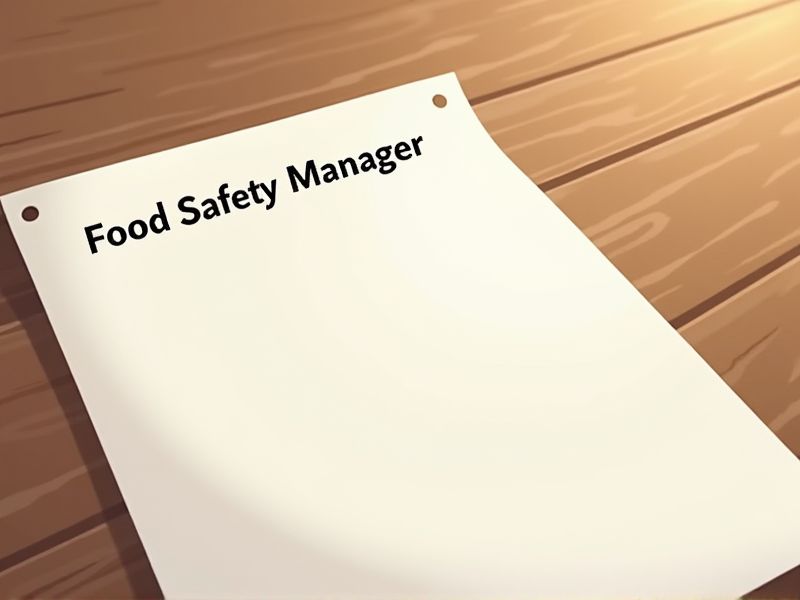
Food safety is critical to public health and the integrity of food systems. The Food Safety Manager plays a pivotal role in preventing foodborne illnesses by ensuring compliance with health and safety standards. Certifications provide these managers with the requisite knowledge and skills to effectively manage potential risks and uphold regulatory guidelines. Some important certifications essential for a Food Safety Manager's role include the following.
ServSafe Food Protection Manager Certification
The ServSafe Food Protection Manager Certification is needed because it validates a manager's understanding of critical food safety principles, reducing the risk of foodborne illnesses. This certification provides formal training on proper handling, storage, and preparation techniques, ensuring food safety compliance. Certified managers often serve as role models, leading teams to maintain rigorous hygiene standards in foodservice establishments. Regulatory bodies and health departments frequently require this certification, reinforcing its role in meeting legal and quality benchmarks.
HACCP Certification
HACCP Certification ensures that a Food Safety Manager can effectively identify and control potential hazards in food production processes. It demonstrates a standardized commitment to food safety regulations, reducing the risk of foodborne illness outbreaks. By adhering to HACCP principles, managers can enhance their facility's compliance with national and international safety standards, fostering consumer trust. The certification also empowers managers with knowledge to implement preventive measures, decreasing operational costs related to contamination incidents.
PCQI Certification (Preventive Controls Qualified Individual)
The PCQI Certification provides Food Safety Managers with the necessary training to develop and implement preventive controls in compliance with the FDA's food safety requirements. Certification ensures that managers are equipped to identify potential hazards and establish critical control measures within food processing operations. It enhances the manager's capability in verifying the effectiveness of their food safety plan, thereby reducing risks of foodborne illnesses. Certified managers contribute to maintaining regulatory compliance and fostering consumer trust in food safety practices.
ISO 22000 Food Safety Management Certification
ISO 22000 certification establishes trust by ensuring that a Food Safety Manager adheres to international standards, leading to enhanced consumer confidence. Implementation of the standard's guidelines aids in the identification and management of potential food safety risks, which reduces the likelihood of food-borne incidents. The structured framework from ISO 22000 helps in streamlining processes, resulting in improved operational efficiency and reduced cost of food safety failures. Certification demonstrates a commitment to continuous improvement and compliance, which aligns with regulatory requirements and can open new market opportunities.
SQF Practitioner Certification
Possessing the SQF Practitioner Certification ensures a Food Safety Manager is adept at understanding and implementing the Safe Quality Food (SQF) Program, a globally recognized food safety and quality standard. This certification minimizes risks associated with food safety hazards within production facilities, which can reduce incidents of foodborne illnesses. It enhances a company's credibility and marketability with buyers who prefer or require compliance with credible safety standards. Certified managers can drive continuous improvement in food safety systems, leading to more efficient operations and less product recalls.
FSSC 22000 Certification
FSSC 22000 Certification provides a robust framework for managing food safety responsibilities effectively, which directly impacts public health and business reputation. Certification aligns a Food Safety Manager with globally recognized food safety management standards, thereby ensuring standardized practices across the industry. Achieving this certification can lead to increased customer trust and can open business opportunities with partners who require stringent food safety compliance. It helps organizations meet legal food safety obligations, minimizing the risk of food safety incidents that can result in recalls, fines, and legal costs.
BRC Global Standard for Food Safety Certification
The BRC Global Standard for Food Safety Certification provides a structured framework for managing food safety risks, ensuring systematic compliance with industry guidelines. With BRC certification, a Food Safety Manager can enhance traceability and recall processes, crucial for minimizing potential foodborne hazards. The certification increases consumer confidence and trust, directly impacting a brand's reputation and market access. Adhering to the BRC standards typically leads to improved operational efficiencies and reduced waste in food production processes.
Allergen Awareness and Management Certification
Increased allergen awareness reduces the risk of accidental allergen exposure, protecting consumers with allergies from potential harm. A certification enhances a Food Safety Manager's capability to implement effective allergen management plans, ensuring compliance with regulations and standards. Proper allergen management minimizes the likelihood of costly recalls and legal liabilities for food establishments. Educated managers foster a culture of safety and awareness among staff, enhancing the overall safety and reputation of the establishment.
GFSI Audit Certification
The GFSI Audit Certification bolsters a Food Safety Manager's credibility by adhering to internationally recognized food safety standards. Compliance with GFSI standards often results in enhanced trust from stakeholders and can facilitate access to global markets. By undergoing the GFSI audit, a manager can systematically identify and mitigate risks within the food supply chain. Achieving certification can lead to improved operational efficiency and reduced likelihood of food safety incidents.
Food Safety Auditing Certification
Food Safety Auditing Certification enhances a manager's ability to identify and address potential hazards, reducing the risk of foodborne illnesses. Certification drives adherence to regulatory standards, ensuring compliance with local and international health guidelines. It boosts consumer confidence as certified establishments are perceived to uphold higher safety standards. The certification process fosters a culture of continuous improvement in food safety practices within organizations.
Summary
When you obtain certifications as a Food Safety Manager, your credibility and expertise in food safety practices are enhanced. This often leads to improved compliance with food safety regulations and protocols within your organization. Enhanced knowledge can lead to better training programs for staff, reducing the risk of contamination and foodborne illnesses. These certifications can also open up career advancement opportunities and may result in increased trust from employers and customers.
